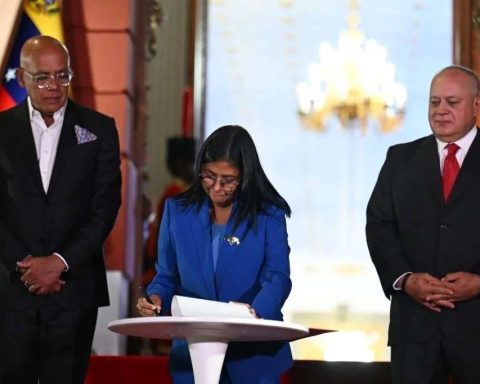With a view to convincing Congress that it is possible to obtain the $12 billion needed to complete the expenses projected for next year of $523 billion, the National Government finally submitted the financing bill, which proposes at least six new taxes in the current tax system, in addition to ending the Simple Tax Regime.
Ricardo Bonilla, Minister of Finance, was the person in charge of presenting this initiative in the Legislative and explained that it has three major fronts to work on, starting with incentives for economic reactivation, the identification of sources of tax revenue and the adjustment of the fiscal rule. All these points, he said, will be reviewed. carefully in the Senate and House of Representatives, to justify its feasibility and necessity.
“The incentives for economic recovery. The most important is the progressive reduction of the nominal rate of the Corporate Income Tax, which goes down from 35%, weighted for large, medium and small. The small ones go up to 27%. That is the case over a period of five years. Meanwhile, for all productive activity, except oil and coal, they remain with the same rates as they have and there are other incentives aimed at financing and supporting renewable energies,” said Bonilla González.
Regarding the sources of financing and revenue projections, the project establishes that its proposals, in net terms, provide additional sources for 2025 of around $12 billion pesos, equivalent to 0.7% of GDP, focusing mainly on measures designed to reduce the fiscal pressures of the Nation, including the carbon tax and VAT on games of chance operated exclusively over the internet.
Under collection
While the financing law will give a breather of more than $10 billion to the State coffers, the money that will be generated by the tax changes is only 41% of the amount of the project, being the tax on games of chance and luck online the most effective, since more than $14 billion would come in for this concept in the next six years.
Ricardo Bonilla, Minister of Finance.
Mauricio Moreno/ Portfolio
Now, as far as taxes that will add resources to the Nation are concerned, there are the modifications to the Personal Income Tax that will generate $900,000 million in 2025, to the Wealth Tax that will contribute $875,000 million, as well as the aforementioned tax on games of chance, which next year will contribute $2.07 billion.
These changes also include the reduction of incentives for electric vehicles, which would raise only $37 billion in 2025 and $268 billion in total, during the six years that the Ministry of Finance calculated in the justification of the financing billFinally, there is the carbon tax, which has a projected revenue of $1.3 billion and is ranked as the second most important tax in official accounts.
“The most important, or the most important, are games of chance in Colombia, which will pay VAT and are now at the same level as companies that provide normal service in this industry, so it is not a new idea, they are all simply in the same bag. The carbon tax goes from $25,000 to $75,000 and the specific allocation remains for the Ministry of the Environment in what corresponds to it and the rest goes to the general budget,” added Ricardo Bonilla.
You may be interested in: ?Will the General Budget for 2025 be issued by decree? Petro opened the possibility
Among these new taxes there is one point that draws attention and it is the effectivenessd in the revenue that will be generated by the elimination of incentives for hybrid vehicles in the country, whose sales have been in free fall according to Andi data for August and in the last five years have not reached 100,000 units sold. All this would lead one to think that perhaps the economic impact is greater than the fiscal benefit from the revenue.
Not convincing
In total, there are 88 pages and 36 articles that make up this bill, which apparently has not convinced Congress, which continues to insist that the way forward is to reduce the budget and debate, without haste and pressure, the tax changes that are needed in Casa de Nariño to ensure fiscal stability and guarantee that social investment can be brought to the regions.

Colombian pesos
iStock
Wilmer Castellanos, coordinator of the Budget project in the Legislature, indicated that after listening to the National Government, there are still many unresolved doubts in the air, especially in areas such as the security of the missing resources and how the rest of the gap will be filled, since it is officially said to be $12 billion, but the accounts are at least double that.
“We hope that we can really discuss this here in the meetings of coordinators and speakers that we are having and that we can review what the budget amount could be that is closer to the reality of the country. We must not overlook the fact that we are also in a bit of uncertainty with this higher collection in the Dian,” he indicated.
Of the $11.8 billion that the Ministry of Finance says will be generated with the financing law, $5.2 billion are for new taxes, while $1.6 billion are linked to improvements in tax operations and $5.3 billion to being able to advance compliance with the fiscal rule, an issue that has been much insisted on in recent months at the Casa de Nariño.
Other news: The New EPS suspended payments to 144 IPS due to inconsistencies in invoices
With this last point, according to Germán Machado, professor of economics at the Universidad de los Andes, it must be taken into account that anticipating the fiscal rule does not generate income for the Nation and that in the future, the tax reform that is intended to be carried out has not been proven effective as a generator of resources.
“The $12 billion Financing Law does not finance the 2025 budget. Only $6 billion would be collected. And part of that is from Dian management. Anticipating the Fiscal Rule does not generate income. In the future, it only generates revenue of $1 billion annually. It is not useful over time,” said this analyst.
Basically, what the National Government is seeking by bringing forward the fiscal rule is to increase its spending margins next year, since it would gain 0.3% of the GDP in surplus in the comparisons of income and expenditure of the Nation. This, according to what has been argued by Casa de Nariño, would be feasible thanks to the good fiscal performance that has been shown in recent years.

Dian
Dian
Goodbye to Simple
Finally, in line with what has already been said, the Financing Law proposes to end the Simple Tax Regime, arguing that it has not fulfilled the objectives for which it was created and that instead of promoting business formalization, it has been used as a mechanism to reduce tax payments by individuals and legal entities that were already part of the ordinary regimes.
“The transition of natural and legal persons to traditional regimes would begin in the 2025 tax year, which is complemented by a marginal rate scheme for the IRPJ, as previously mentioned. The above, in view of the deficiencies noted and based on the evidence collected during the years of operation of the RST, the national Government proposes alternatives so that micro and small businesses can access benefits without opening the door to tax evasion,” they concluded.
Once its cards have been revealed, the Ministry of Finance’s priority will now be to promote this proposal along with the General Budget of the Nation for next year, in the midst of an environment that is not favorable to it and where there was even talk of issuing regulations by decree.


















